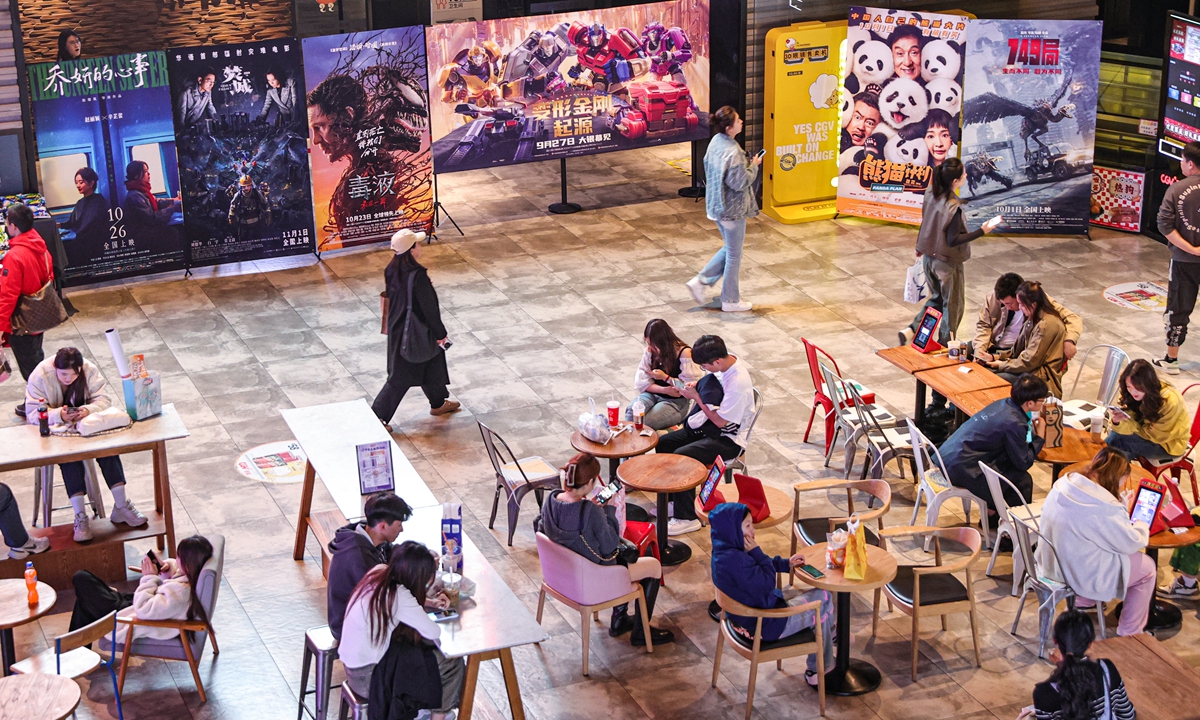
Moviegoers wait in a movie theater in Shenyang, Liaoning Province, on October 7, 2024. Photo: VCG
Chinese veteran filmmaker Zhang Yimou's recent comment during an interview about urging audiences to step into cinemas rather than watching three-minute video summaries on their phones has garnered widespread attention on social media. Film critics remarked that finding the right balance between short videos and traditional cinema is crucial.
In a recent interview with Xinhua News Agency, renowned director Zhang Yimou expressed his disappointment: "As a filmmaker, I still hope that viewers will come to the cinema. It's best not to watch a movie on your phone, and certainly not through a three-minute synopsis. It's truly disheartening, as a director, to see this."
Zhang's comment garnered widespread discussion on Sina Weibo on Tuesday, with some netizens agreeing and highlighting the superior experience of watching a film in a theater, while others pushed back, arguing that when the quality of a film falls short, going to the cinema becomes a waste of money and time. Meanwhile, some viewers believe short video summaries serve as a mere primer for them - like an appetizer for the main course, sparking an interest to watch the full film in the theater.
"The real issue now is that young people are detached. We need to attract them. Sometimes, these summaries do draw in a crowd, but it's a challenge to strike a perfect balance. The key is knowing where to draw the line," Tan Fei, a renowned movie critic and film producer, told the Global Times on Wednesday.
From Zhang's calls to action to audience responses, it's clear that industry professionals must acknowledge the current challenges and the demands of moviegoers.
The film industry is facing the inevitable competition from the onslaught of various forms of entertainment. Beyond short videos, online gaming, livestreams, vertical dramas, and virtual reality travel experiences are all vying for attention, stealing audiences away from the big screen.
"The film industry is in a major crisis, not just domestically but globally," Tan reflected. "I've been following the comments around Zhang's interview, and it serves as a wake-up call for film professionals. The industry must embrace young people, embrace short videos - this wave is unstoppable. The key is to face it with a positive mindset."
Today, audience habits and consumption patterns have changed radically. This shift isn't just about technology or trends, but about a fundamental change in how people connect with media.
The enthusiasm for films like Hi, Mom and The Wandering Earth show that audiences are still eager to go to the cinema as a cultural experience. As the Chinese film market evolves and audiences' tastes become more refined, there's now a higher bar for both the quantity and quality of films.
Not only have viewers criticized the subpar quality of certain movies, but Zhang himself noted, "In the age of the internet, young people have seen it all. If your film doesn't live up to expectations, they'll notice immediately and cast it aside. It's a very harsh reality."
"The key issue is that movies must be unique, must have the power to let the audience dream, and must be driven by a strong narrative. There must be a twist, a plot that challenges the imagination. And, yes, a bit of comedy, something that brings laughter and shared moments," Tan emphasized. The multidimensional growth of cinema is key to ensuring that short videos push audiences back into theaters, with short videos themselves acting as an ally to films, rather than a rival.
Of course, the entry of short videos into the film ecosystem must come with some regulation. "The main issue is copyright. Some short videos, without regard for copyright, leak plot points from low-budget suspense films, and this is something that needs oversight," Tan said.
In Zhang's view, "Good films, blockbuster films, are still too few. Most are just 'one-day wonders,' and their box office doesn't even cover production costs. This prevents a healthy cycle from forming." It is only through great films that they can win back audiences and bring them back into theaters, before movies become nothing more than fleeting three-minute summaries.
The author is a reporter with the Global Times. life@globaltimes.com.cn




